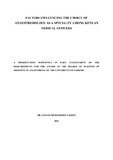| dc.description.abstract | Background
The scope of anaesthesiologists has expanded tremendously in recent years. Despite its central role in modern healthcare delivery, medical officers have had difficulty in settling for anaesthesiology as a prospective career choice. This has led to a shortage of physician anaesthesiologists in the country. As a result, many anaesthetics are performed by non-physician practitioners.
Objectives
The objectives were to identify the factors influencing the choice of anaesthesiology as a specialty among Kenyan medical officers, to determine factors that attract and those that deter doctors from the specialty and to propose measures that can be taken to make the specialty more attractive among medical officers to reduce the existing shortage.
Methods
This was a cross sectional descriptive study design. Each of the 290 participants was contacted directly via phone call and email and the nature of the study explained. Thereafter the principal investigator or the research assistants personally visited the doctors in their facilities. The nature of the study was explained again and consent sought. After reading and understanding the consent explanation, participants signed the consent form and proceed to filling the self administered questionnaire. On completion, questionnaires were handed back to the principal investigator or research assistants for data analysis.
Results
All 290 completed forms were returned duly filled; 166(57%) of the respondents were males while 124 (43%) were females. The average age of the participants was 27.58 years. Only 13(4.5%) of the participants chose anaesthesiology as their first choice, 16(6.6%) as a second choice and 6(3.1%) as a third choice. The most preferred specialties of choice were surgery 125(44.8%), obstetrics and gynaecology 94(33.7%), paediatrics 73(26.2%) while internal medicine was at 60 (21.5%). The factors that attracted those who selected anaesthesiology as a career choice were; financial and material rewards, length of postgraduate program and flexible working hours. Those that did not select anaesthesiology cited dependence on surgeons, long/inflexible working hours, minimum patient contact and little previous exposure to the specialty as the main deterrents. To improve the experience at undergraduate level, it was suggested to increase the rotation time and to have a more practical teaching approach. In addition, at internship level, it was suggested that a mandatory anaesthesia rotation be introduced to increase exposure to the specialty. | en_US |



